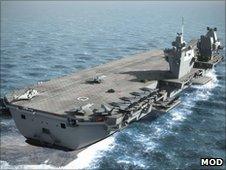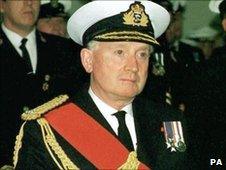Former navy chief in government cuts warning
- Published

The government gave the go-ahead for two new aircraft carriers in 2008
A decade of under-investment has left the Royal Navy with a serious shortage of ships, according to the former First Sea Lord Admiral Sir Jock Slater.
The former head of the Royal Navy said in an interview with BBC Radio Solent that any further cuts would lead to an "enormous strain" on the service.
As head of the navy between 1995 and 1998, Admiral Slater played a key role in the last strategic defence review which took place 12 years ago.
At the time he successfully argued the case for more than 30 frigates and destroyers, but it was a promise which was not to be kept, and in the years which have followed he said the Royal Navy has struggled to stay afloat financially.
It has been forced to retire ships early, cut back on maintenance, and do without many of the new ships it once expected to receive.
'Steadily declined'
Admiral Slater said he was particularly concerned by the decision to halve the size of a new fleet of Type 45 destroyers, and blamed the out-going Labour government for a decade of under-investment.
He said: "In the last review of 1997 to 1998 I argued for aircraft carriers, nuclear submarines and the amphibious capability, with supporting frigates and destroyers, small ships and of course the Royal Fleet Auxiliary.
"The carriers remain in the programme and that is great... but tied to that were 12 air defence destroyers and there are now going to be just six new Type 45s.

Lord Admiral Sir Jock Slater was first sea lord between 1995 and 1998
"I argued for 35 frigates and destroyers, George Robertson reduced it to 32, and it's gone down to 22. That's simply unsatisfactory."
Labour said it had to make Afghanistan its priority and could not afford to pay for the number of ships that were in service.
It said the Royal Navy could get by with fewer, more powerful warships, and the number of vessels has steadily declined.
Admiral Slater said he understood the need to set priorities, but he said he believed the failure to look beyond Afghanistan was short-sighted.
"In the last defence review we had Tony Blair and Gordon Brown firmly on-side at the end.
"What the government failed to do thereafter was to resource the defence review, and that's why we are where we are today.
'Severe pressure'
"It's all very well for people to fire shots and say these [ships] are far too expensive now.
"It takes a long time to build a ship and to prepare the crew, so we really need to look beyond Afghanistan.
"Afghanistan must be our top priority. It simply must be and we've got young servicemen, particularly in the Army and the Royal Marines, who are losing their lives.
"We must concentrate on Afghanistan today but we mustn't lose sight of the fact that beyond Afghanistan is the future, and the future is uncertain."
With a new defence review approaching, the former first sea lord has warned that any future cuts to the Royal Navy would put it under more severe pressure.
He said: "I've always said that if we want to do what we said what we would to do... being able to go to where the enemy is, as opposed to the enemy coming to us, then it needs to be flexible, it needs to be versatile, and that's elements of land, air and sea power... and that's what is going to be under enormous strain as we go forward to the next defence review."

Liam Fox said the UK's military capability must be flexible
Admiral Slater said he was also worried that the Royal Navy could lose its Trident submarines.
The vessels currently provide a nuclear deterrent because the submarines, under the waves in secret locations, would be almost impossible to destroy in a pre-emptive strike.
But critics say Trident is too expensive, and there have been calls to either scrap the nuclear deterrent or switch to a cheaper land-based missile system.
Admiral Slater says that would be a terrible mistake.
He said: "I'm in no doubt that if you have the nuclear deterrent, even the minimum nuclear deterrent, then we would be out of our tiny minds to dispense with it, and the right way to do that at the moment is under the water."
Defence Secretary Liam Fox said nothing is ruled out in the review which will examine what sort of armed forces are needed in future and the cost involved.
- Published21 June 2010
- Published13 June 2010